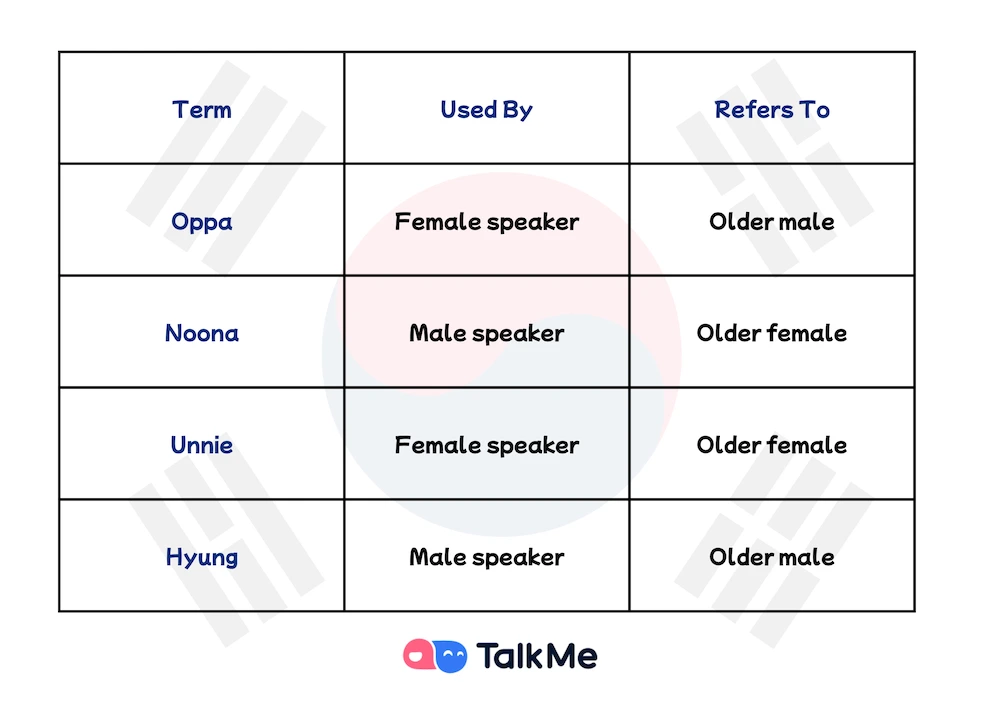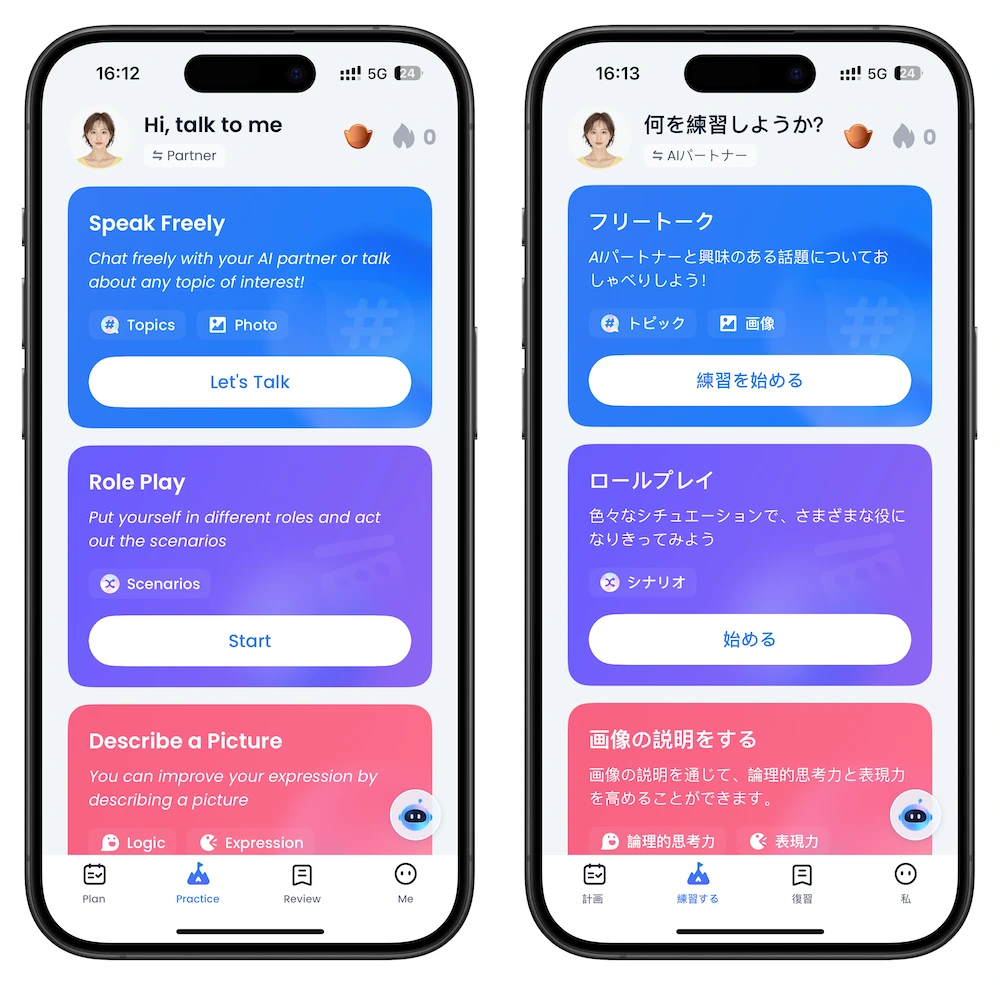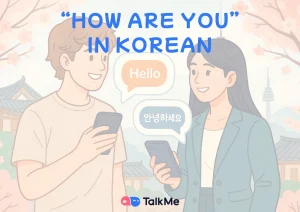From the global sensation of BTS to the emotional rollercoasters of K-dramas, Korean pop culture has captured the hearts of fans worldwide. With this cultural wave, many Korean words and phrases have made their way into everyday conversations — and one of the most commonly heard is “oppa.”
Whether it’s in fan chants at a K-pop concert or a romantic confession in a drama, “oppa in Korean” seems to carry a lot of meaning. But what is oppa, really? And why does it sometimes mean “older brother” and other times “boyfriend”?

In this blog post, we’ll explore the true oppa meaning, its use in different contexts, how it compares to other Korean honorifics, and how you can learn to use it naturally with tools like TalkMe AI.
What Are Korean Honorific Titles?
In Korean, respect and hierarchy are deeply embedded in the language. This is where honorific titles (호칭) come in. These titles are not just polite expressions — they’re essential to how Koreans communicate based on age, gender, and relationship.
Here are a few common Korean honorifics you’ll hear:
- Oppa (오빠): Used by females to address an older male
- Noona (누나): Used by males to address an older female
- Unnie (언니): Used by females to address an older female
- Hyung (형): Used by males to address an older male
Each of these reflects a layer of social and emotional nuance that makes Korean both beautiful and complex.
What Does Oppa Mean in Korean?
Ainsi, what does oppa mean in Korean?
At its core, oppa (오빠) literally means “older brother” when spoken by a female speaker. However, its meaning is much broader depending on the context.
Contextual Meanings:
- Older Male Friend: A casual, affectionate way for a younger female to refer to an older male friend.
- Boyfriend or Romantic Interest: In romantic contexts, “oppa meaning boyfriend” is very common. When a woman says “oppa” to her partner, it adds a touch of sweetness and emotional intimacy.
- Male Idol/Celebrity: Female fans often refer to male celebrities as “oppa” even if they don’t know them personally. It signals admiration and affection.
Emotional and Relational Nuance
Using “oppa” implies a bond of trust, closenesset respect. It’s not just about age — it’s about the relationship dynamic.
Example Sentences:
- 오빠, 오늘 영화 볼래?
Oppa, do you want to watch a movie today? - 이 오빠 진짜 잘생겼다!
This oppa is really handsome!
Pronunciation Tips:
- 오빠 is pronounced like “oh-ppa”, with a short, soft pause between syllables.
When and How to Use Oppa
Appropriate Contexts:
- Among siblings: A younger sister referring to her older brother.
- Close friends: A female speaking to a trusted older male friend.
- Romantic relationships: A girlfriend might call her boyfriend “oppa.”
- Fans to male idols: Fans often scream “oppa!” at concerts or fan meets.
Inappropriate Situations:
- Formal settings: In a business meeting or formal workplace, using “oppa” would be considered too casual.
- With strangers: Using it with men you’ve just met might feel too forward.
Notes on Age and Etiquette:
In Korea, age hierarchy is key. You typically only use “oppa” if the man is 1–10 years older than you. Too large an age gap or too little familiarity makes the term inappropriate.
Oppa Gangnam Style & Pop Culture
One of the most globally recognized uses of “oppa” comes from the viral hit “Gangnam Style” by Psy.
What Does “Oppa Gangnam Style” Mean?
In the song, “oppa gangnam style” loosely translates to “I’m the kind of man who has Gangnam style.” Here, Psy is referring to himself as “oppa,” projecting confidence and coolness in the posh Gangnam district.
Global Recognition
Thanks to the song’s success, “oppa” entered global vocabularies — often humorously or playfully, even if slightly misunderstood.
Other Pop Culture References:
- In K-dramas like Boys Over Flowers ou Crash Landing on You, female leads often use “oppa” to express affection.
- K-pop idols often joke with fans using “oppa oppa,” emphasizing charm and fan service.
What About Noona, Unnie, and Hyung?
Let’s break down the rest of the family of honorifics, so you can better understand when to use each one.

Example Sentences:
- 형, 이거 도와줄 수 있어?
Hyung, can you help me with this? - 언니, 이 옷 어때?
Unnie, how does this outfit look?
Understanding these helps you communicate respectfully and build stronger relationships with Korean speakers.
Levels of Formality in Korean
Korean has different speech levels depending on your relationship with the listener:
1. 높임말 (High Formal Speech):
Used in ceremonies, public speeches, or with strangers of higher status.
2. 존댓말 (Polite Speech):
Used in daily conversation with acquaintances, colleagues, or elders.
3. 반말 (Casual Speech):
Used with close friends, family, or those younger than you.
“Oppa” is a casual term, often paired with 반말. Using it with polite or formal speech may sound awkward or overly mixed.
Learn Korean Easily with TalkMe AI
Want to master Korean honorifics like oppa, noonaet hyung with confidence?
TalkMe AI is your ultimate language learning companion. This innovative AI-powered app helps you speak Korean naturally, with features designed for real-life use.

What Makes TalkMe AI Stand Out?
- Real-Life Conversation Practice: Chat with an AI that speaks Korean just like a native — and uses honorifics appropriately.
- Role-Play Scenarios: Practice using “oppa” in flirty, friendly, or emotional contexts through simulated K-drama dialogues.
- Instant Grammar & Pronunciation Feedback: Say “oppa” and get real-time tips on how to say it better.
- Cultural Context Learning: Understand not just what words mean, but when and how to use them correctly.
Whether you’re a K-drama fan or planning a trip to Seoul, TalkMe AI makes learning fun, practical, and fast.
Try TalkMe AI for free and start speaking like a native today!
Bonus: How Are You in Korean?
While you’re learning common expressions like “oppa,” it’s also helpful to know essential phrases like "how are you in Korean." Just like in English, there are multiple ways to ask this, depending on the level of formality.
Most Common Phrases:
- 잘 지냈어요? (Jal jinaesseoyo?) – “Have you been well?”
This is the most typical way to say “how are you” in Korean politely. - 잘 지냈어? (Jal jinaesseo?) – Casual version
Use this with close friends or younger people. - 안녕하셨어요? (Annyeonghasyeosseoyo?) – Very formal
Appropriate for elders or in formal settings.
These phrases are commonly used as greetings, especially when you haven’t seen someone in a while. Understanding when to use each version ties back to the speech levels we discussed earlier: 높임말, 존댓말et 반말.
Want to practice saying “how are you” in Korean and get feedback? TalkMe AI can guide you through these expressions with proper pronunciation and usage in real-life scenarios.
Wrap-Up
Comprendre la oppa meaning in Korea gives you a deeper appreciation for Korean culture and language. It’s not just about learning a word — it’s about understanding relationships, emotions, and social dynamics.
By also learning noona, unnieet hyung, and mastering levels of formality, you’ll become a much more respectful and effective Korean speaker.
Ready to take your learning to the next level? Let TalkMe AI be your guide.

